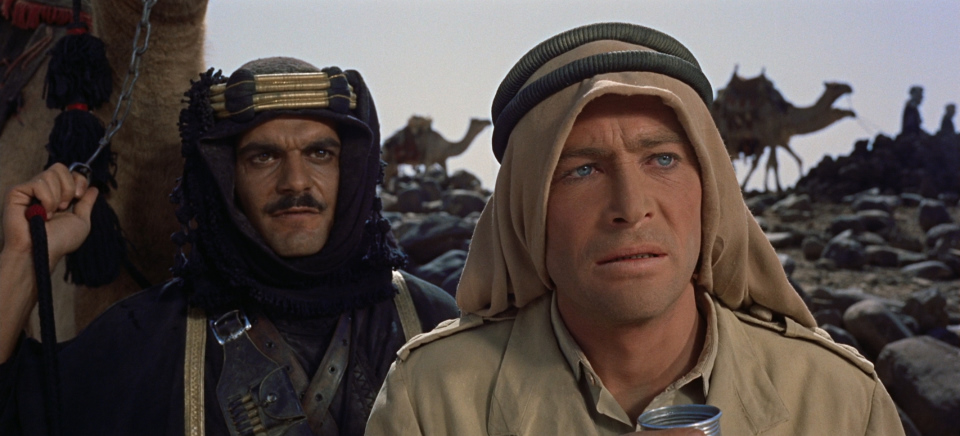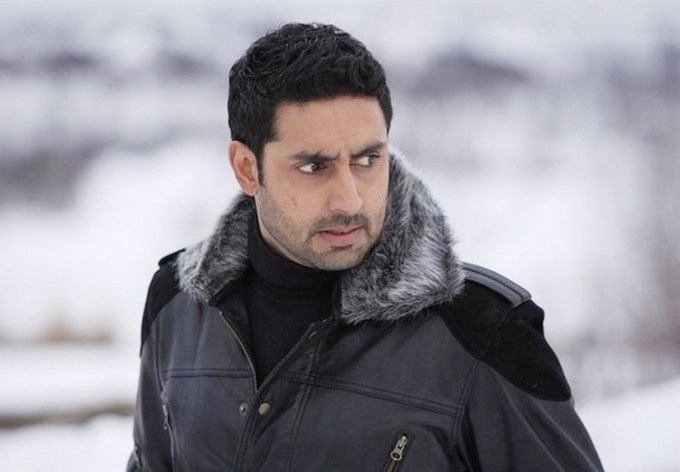There are classics and then there are CLASSICS. Up until now, I’ve been using the tag simply to mean “films that existed before I started my blog” which applies to pretty much anything older than a decade. 2002 mediocrity Men with Brooms pushes the genuine definition of “classic” significantly – it’s not really a classic in any sense of the word. Lawrence of Arabia, however, a film older than me and closer to the first talkie than the 21st century, a film with seven Academy Awards and a lifetime appointment on most top 100 lists … now that’s a classic. And it’s high time for a FrogBLog revisitation.
During the Africa/Middle East portion of WWI, British Lieutenant T.E. Lawrence (Peter O’Toole) decides this darn war is just no fun unless he’s allowed to play in the desert. Reluctantly, his superiors give in, realizing the overeducated and maddeningly mild-mannered soldier has little value as a grunt. So, given little more instruction than, “here’s a guide, there’s the desert, report back when you’ve won the war,” Sandy Larry is sent in search of his fortune. He will obtain it one Bedouin at a time.
The first ten minutes of this four-hour guide to the color butterscotch take place in England, where a post-war-but-still-young Lawrence auto-hanks on a motorcycle and is given a hero’s funeral. Hence, it’s hardly a secret that however odd and ill-suited towards the British Army Lawrence is, we know we are watching the birth story of a legend.
What strikes one constantly about this film is Lawrence’s confrontational-yet-non-aggressive solution-driven behavior. Nowhere is this more apparent than his first scene of real danger. Stopping for water on his way to meet Prince Faisal (Alec Guinness; key Middle-Eastern natives in this film are played by Guiness, José Ferrer, and Anthony Quinn – yeah, that wouldn’t fly today), Lawrence’s guide is shot dead by Sherif Ali (Omar Sharif) for partaking of a well forbidden to his tribe. Lawrence makes no attempt to pick up a weapon to defend himself; but he makes very clear he doesn’t hold with Ali’s actions especially as the latter has just killed his friend in cold blood. Here we get a good taste of who Lawrence is – a pacifist not afraid to address danger nor afraid to make friends among the Bedouins who were easily scorned and dismissed by his fellow countrymen.
Here also, we get a feel for what this picture is about when Lawrence calls in frustration, “Sherif Ali, so long as the Arabs fight tribe against tribe, so long will they be a little people, a silly people, greedy, barbarous, and cruel as you are.” Is this summation accurate? Racist? Antagonistic? The nations that inhabit the Middle East today did not exist until the English drew up fairly arbitrary boundaries after the defeat of the Ottoman Empire. We know Lawrence wasn’t a fan of the boundaries … but he also wasn’t a fan of tribal Arabia. Where is the truth?
I’m not sure I’ve conveyed the strength of this picture. It’s a visual feast with an unforgettable soundtrack; it’s essentially a character study … of a man who both invented and volunteered for the adventure of a lifetime, an adventure no other Englishman desired and one without great chance of survival. This is a picture skillfully constructed to allow for both believers in white saviorism and critiques of white saviorism. Historically, this film went a great way towards bridging the gap between Anglos and idle Middle Easterners while widening the chasm between them at the same time … which is a neat trick. For its length and methodical story-telling, it is a great film. The single-worst attack I can offer has nothing to do with pace or racism; there are no women in the film. Seriously. Try and find one. Good luck. Lawrence of Arabia doesn’t just fail the Bechdel Test; it doesn’t even merit debate – it fails Bechdel in the imdb cast page alone.
As Americans, we’ve been so inundated by the examples of Rambo and John McClane, we’re apt to forget that every nation has its own warrior mythology. From films like Bridge on the River Kwai and Lawrence of Arabia, it is only too obvious what British warrior mythology looks like … and, let’s face it, Americans have never been more than metaphorical world beaters; the Brits really did run the world once upon a time. And Colonel Nicholson and T.E. Lawrence are who the Brits consider when they wish to absolve themselves of their imperialism. We look at these tremendous cinematic experiences and imagine the world under British rule might not have been so bad a place. These thoughts come from the same internal source that needs to justify: “American slavery wasn’t so bad.” Yes it was. And the self-sacrificial decency of Colonel Lawrence is a grand aberration. You don’t take the world by playing nice.
Could Lawrence of Arabia be made today? No. Even if you got past the problematic casting issues and the problematic condescension issues, you’d have a huge problem with theme. Lawrence’s white savior bravado would have to be re-imagined as outlandish naïveté –which, don’t get me wrong, it is; it’s one of the reasons the film still works—but there’s no way to play that in a modern role of white savior-dom. Either you go all in, in which case the film isn’t PC and deservedly critiqued for such, or you lessen the impact and rewrite the film as Ali of Arabia, which doesn’t work either. Lawrence of Arabia doesn’t deserve to be treated like Birth of a Nation, which should only be viewed in contextual circumstances. Lawrence is a great film, but it is also dated, which is something I think would make the depiction of T.E. Lawrence in this film a little sad.
He lives where ground is sandy and course
Wears robes and totes a sword, of course
Then a young warrior shows
And Alec, goodness knows
When does he teach Lawrence The Force?
Rated Approved (whatever that means), 228 Minutes
Director: David Lean
Writer: Robert Bolt, Michael Wilson
Genre: Epic
Type of being most likely to enjoy this film: People who love film more than they love the modern world
Type of being least likely to enjoy this film: Those who cannot remove their critic hat




